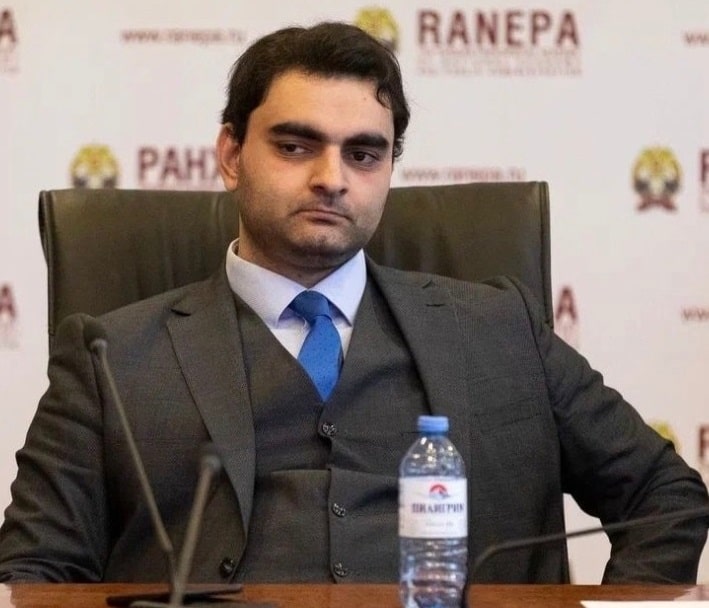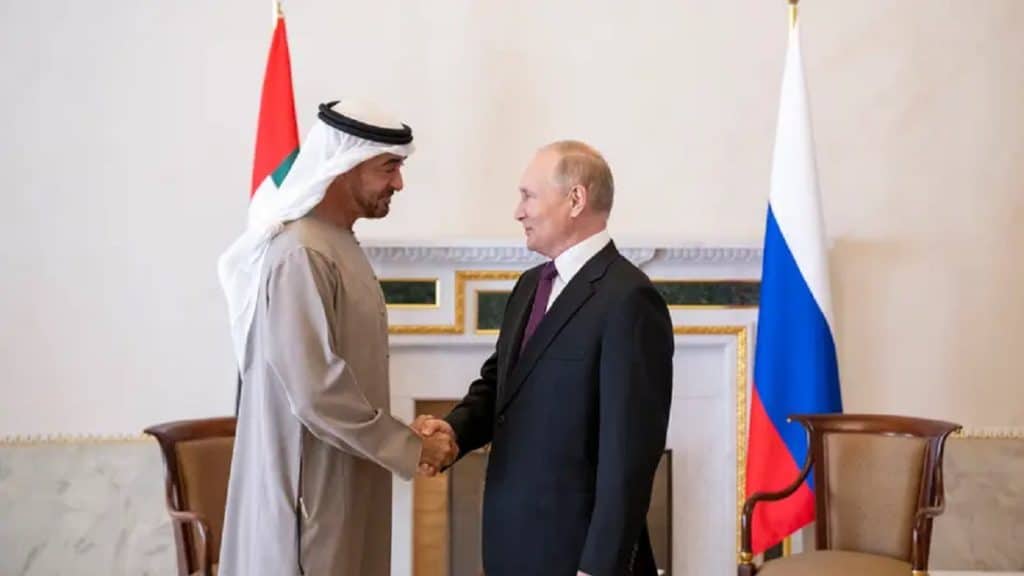World Geostrategic Insights interview with Alexander Hoffmann on the strategic drift in the Gulf region, the foreseeable developments in Russia’s influence in the Middle East, and the prospects for Moscow-Tel Aviv relations after the consolidation of Russia-Iran military-technical cooperation.

Alexander Hoffmann is a Russian consultant and the Head of the Department of Information Support for International Activities of the Russian Presidential Academy of National Economy and Public Administration (RANEPA).
Q1 – Changes in U.S.-Gulf relations, which have been in decline since Obama’s second term. With the arrival in power of the “new generation” of Gulf princes (Mohammed ben Salmane in Saudi Arabia, Mohammed ben Zayed in the United Arab Emirates), cooperation with Washington has turned from a strategic alliance (often summarized in the “oil-for-security” equation) to a transactional partnership, which fluctuates depending on the regional and global situation. The United States seems to have lost authority and credibility in a region that now looks to Russia and China to meet its economic and security needs. In your opinion, what have been the strategic mistakes made by the United States with reference to the Gulf countries?
A1: I would not call these mistakes strategic yet, rather tactical. However, the sum of tactical mistakes can lead to the strategic tragedy of American policy in the Gulf. Still, the Biden administration may change, and with it the mood in relations between the United States and the Gulf countries may also change. And this is an extremely likely scenario if the team formed during the Obama-Biden period leaves.
Washington remains the dominant defense and security partner of the Gulf monarchies. In my opinion, this is a fundamental factor in their relationship.
However, the turbulence of the American approach to the situation in the region (contrasts between the Trump and Biden administrations) may cause a strategic drift, which I would rather call the diversification of the Gulf countries’ global guidelines.
Rising regional powers, especially Saudi Arabia and the UAE, which are gaining more and more global influence, will look for an opportunity to hedge against the risks of US policy volatility. And this is not only about expanding partnerships with Russia (geopolitics, energy) or China (international trade, technology), but also using their own capabilities and resources.
Now these two countries are the geo-economic centers of gravity of the Arab and Muslim world. It is quite possible that their role as potential leaders of the new Arab macro zone may become quite real.
Everything depends on the political will of their leaders, the success of the implementation of their long-term strategic programs (carrying the image of the future) and the ability to independently ensure their own security, as well as the security of the region (or macro zone). It is clear that without taking into account the interests of the current global powers, this is difficult to implement.
Q2 – Moscow has carefully built a strong position in the Middle East, based mainly on three fundamental pillars: success in Syria, a diplomacy capable of dialogue with all regional actors, and an image as a guarantor of stability. Faced with the uncertainty of US policy, Russia presents itself to Arab countries as a reliable ally, a promoter of stability and an effective mediator. Moscow’s close ties with Arab countries are also reflected in their position on the Ukraine conflict, where most Arab countries seem to have adopted a neutral stance. In your opinion, did the war in Ukraine generate new dynamics in the Middle East, or did it confirm and accelerate processes already underway? What do you think will be the main developments in Russia’s economic, military, diplomatic and cultural influence in the Middle East in the coming years?
A2: Moscow has a fairly good influence in the Arab Middle East, not only thanks to the Soviet legacy (the universalist ideology of the USSR and relations with the socialist Arab countries), but also the new role of Russia in the region, which, moreover, received a foothold in Syria.
Yes, the main part of the current influence of the Kremlin in the region is now associated with the global energy market and varying degrees of involvement in the settlement of regional contradictions or conflicts, but the leaders of the rising powers in the region understand that the armed conflict on Ukrainian territory and the response to the actions of Russia during its special military operation, it is a living model of the situation in which they may find themselves, when national security interests may collide with containment from the Atlantic community. Especially since the ambitions of the Gulf powers are quite broad.
As for the Kremlin’s economic influence in the region, it is necessary to develop a business environment, both between individual countries and Russia, and at the Russia-Arab Middle East level. So far, this issue has not been sufficiently worked out, and the involvement of state corporations and large businesses is clearly not enough.
Regarding military influence, one should observe the development of military-technical cooperation and the possibility of expanding the Russian military presence in the region. There are opportunities for this. Much, however, depends on the outcome of the special military operation.
Russian culture is traditionally attractive, but I would use a broader concept – humanitarian influence. In September, Putin approved the concept of Russia’s humanitarian policy. In it, the Arab Middle East is given a special place, including the list of Arab countries that should be given increased attention within the framework of humanitarian cooperation.
Without more active efforts to promote Russian education in the region, this will be difficult to achieve. The Kremlin has rich Soviet experience here. However, the region’s needs and opportunities have changed somewhat.
And as for diplomatic influence, Moscow has a veto power in the UN Security Council. I would take this possibility into account first. The Arab powers have appreciated it more than once in recent years.
Q3 – Israel also maintains strategic relations with Moscow to control Iranian activities in Syria and stop arms transfers to Hezbollah in Lebanon. In addition, Jerusalem needs to keep good relations with Moscow over the Jewish diaspora in Russia. But now Iran’s recent arms shipments to Russia are a concern for Jerusalem, and Kiev officials are hoping that Iran’s war aid to Russia will convince Israel to abandon its stance of refusing military assistance to Ukraine. Do you think the Russian-Iranian arms deal, and in general the cementing of an alliance between Moscow and Theran against the West, could spoil Russian-Israeli relations?
A3: Tel Aviv’s fears about the rapid development of military-technical cooperation between Moscow and Tehran are tantamount to the Iranian side’s fears about similar cooperation with Israel from countries sharing land and sea borders with Iran. The large-scale military exercises of the Iranian defense and security forces and their information support have demonstrated that
Iran is no less concerned about Israeli military intelligence activity along its northern and western borders.
At the beginning of this year, Moscow and Tehran renewed their strategic partnership agreements, which were first reached just over 20 years ago. This happened against the backdrop of an aggravation of the situation in relations between Iran and Azerbaijan due to Israeli military intelligence activity (including using the capabilities of electronic intelligence) in the border regions.
In addition, it is highly likely that the terrorist attacks on Iranian strategic facilities, as well as the physical elimination of key scientists of the Iranian nuclear program and senior members of the security forces of the Wilayat al-Faqih, are the result of the efforts of the Israeli intelligence agencies. Obviously, such actions could not be carried out without operational and technical support from FVEY partners, who are now jointly participating in a large-scale network-centric war against Iran. In addition, the intelligence agencies of the Atlantic community and Israel have well researched vulnerabilities in Iran’s security system at all levels, from human intelligence at the level of Iranian state security personnel, to the creation of threats to the country’s critical infrastructure through modern technical means.
Tel Aviv, having serious security threats from the territory of Palestine and Lebanon, is striving to create similar conditions for the Iranian side as a response. Russia is not interested in destabilizing the situation in Iran, as it considers Tehran, first of all, as a strategic trade and economic partner and one of the key participants in initiatives related to the INSTC.
Considering that with the accession to power of Lapid, relations between Moscow and Tel Aviv are rapidly deteriorating, at the moment there is neither the issue of security cooperation in the Levant, nor the issue of the interests of the Jewish diaspora in Russia cannot be called more important for the Kremlin than socio-political stability in Iran. Especially considering that security in Syria is ensured in close cooperation between Moscow and Tehran, and the main aggressor is precisely Israel, which has repeatedly attacked Syrian territory.
With the current influence group in power in Tel Aviv, Israeli relations with the Kremlin would definitely continue to deteriorate and would not have serious prospects for balancing with the priorities of the Russian foreign policy initiative in the Iranian dossier. However, the internal political configuration in Israel is changing again, relations between Moscow and Tel Aviv can be restored at the same level. Netanyahu’s success in the parliamentary elections favors the second scenario.
Alexander Hoffmann – Russian consultant and Head of the Department of Information Support for International Activities of the Russian Presidential Academy of National Economy and Public Administration (RANEPA).







